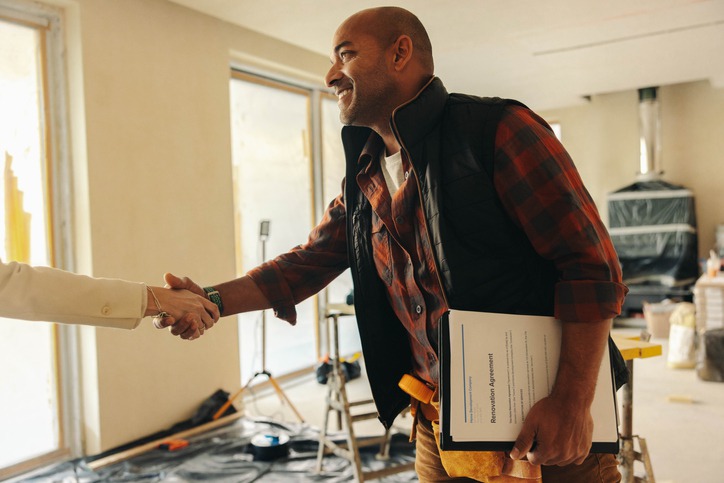Hiring a reputable restoration contractor after property damages is important to ensure effective repairs and stress-free experiences. Selecting a credible contractor saves from potential complications like insufficient work or legal issues. Checking a restoration contractor’s credentials thoroughly helps confirm professionalism, reliability, and their ability to handle necessary tasks.
What Steps Should You Follow to Confirm Your Contractor’s Authenticity?
Step #1 Check for Proper Licensing
Always verify that a restoration contractor has the appropriate licensing for your area. Licensing guarantees that the contractor meets specific industry standards established by local or state authorities. You can usually confirm licenses by directly contacting your local or state licensing boards or online databases.
Licensed contractors have gone through rigorous evaluation, proving their knowledge and skills. Unlicensed workers may perform substandard work, leading to further costs. Never overlook licensing, as it’s often what protects your rights in transactions.
Step #2 Confirm Insurance Coverage
Contractors should ideally carry general liability and workers’ compensation insurance. General liability protects clients from being held responsible if accidental damages occur on the property during work processes. Workers’ compensation insurance covers company employees in case of injury incurred while working.
Don’t hesitate to request proof of insurance directly from the contractor. A respected professional won’t mind providing the necessary documentation. Verifying insurance is simple, yet it prevents unexpected liabilities down the road.
Step #3 Validate Certifications and Training
Certifications indicate that the restoration contractor has undertaken professional training related specifically to restoration services. Not all contractors possess equal knowledge; specialized certifications provide assurance of higher-quality services. Certifications vary by discipline, such as water damage, fire damage, mold remediation, or related services.
Enlisting companies versed specifically in residential construction clean up greatly aids proper home restoration processes. Experienced cleaning teams effectively remove wastes left behind from construction activities. Homeowners receiving prompt cleaning assistance may avoid injuries related to scattered construction materials.
Step #4 Request References from Past Customers
Reputable contractors keenly share previous customer testimonials and references. References offer first-hand impressions about quality, efficiency, and reliability regarding previous projects. Invest some time in contacting these references and discussing their overall experiences with the candidate.
Request at least three references to gain balanced perspectives. Used effectively, references provide clear impressions about prior work standards. Positive feedback from multiple parties strongly signals professional reliability.
Step #5 Consult Reviews and Ratings
Online reviews significantly inform about contractors’ reputations. Platforms such as Google Reviews, Better Business Bureau, Angie’s List, and Yelp display customer insights. A restoration contractor possessing high ratings and numerous reviews demonstrates previous customer satisfaction and industry credibility.
Conversely, contractors with countless negative reviews should raise red flags quickly. Observe patterns in positive and negative comments to correctly assess contractor behavior overall. Spend sufficient time researching reviews to better understand which contractors likely meet your needs.
Step #6 Inquire About Industry Experience
Restoration contractors with substantial experience regularly possess improved problem-solving abilities. Experience provides critical benefits throughout project execution stages, particularly for complex restoration assignments. When meeting with potential candidates, carefully discuss their work history and areas of expertise in restoration. Contractors with significant industry experience effectively anticipate problems, reducing unwanted delays.
It’s beneficial to select contractors possessing specialized skills alongside broad, relevant experience. Additionally, if you’re dealing specifically with damage from fires, seeking contractors with expertise in fire restoration services Oak Park ensures they can adeptly meet customer requirements.
Step #7 Visit Their Physical Office
Legitimate restoration businesses typically maintain a physical location where customers can inquire about services. Visiting in person provides insights into operational management and professional demeanor. Discussing your restoration needs personally allows you to evaluate the contractor directly before hiring.
Observe staff reactions, professional conduct, and facility standards. Office presence helps alleviate worries by confirming permanent management exists behind advertised branding. Contractors without dedicated premises might create risks in achieving desirable results.
Step #8 Avoid Suspicious Estimates
Always approach contractors offering notably lower estimates cautiously. Restoration tasks involve particular procedures requiring costly resources. Significantly reduced pricing might signal inferior materials, inexperienced laborers, or even fraudulent intentions toward customers.
Selecting experts proficient in handling property restoration Oak Park, improves repair effectiveness. Restoration professionals often utilize cutting-edge technology to suitably address restoration projects. Homeowners seeking successful restoration expertise benefit tremendously by enlisting reputable residential restoration specialists exhibiting high industry competence.
Important Questions to Ask a Restoration Contractor
During initial conversations, asking questions effectively clarifies restoration providers’ competencies. Use these important questions:
-
What specific restoration services can your business manage effectively?
-
Can you outline your typical workflow on properties similar to mine?
-
Will the project manager regularly update me throughout the process?
-
What additional costs could realistically arise during restoration tasks?
-
Could you supply a timeline detailing each project’s phase?
Answers frequently indicate whether a candidate aligns suitably with specific project needs. Taking initiative in interviewing during initial meetings often uncovers advantages or weaknesses worth considering carefully. Thorough inquiries save concerns regarding contractors’ service promises falling short later.
Common Pitfalls in Verifying Contractor Credentials
Understand brief cautions commonly encountered while verifying restoration credentials:
-
Ignoring insurance verification causing liabilities later.
-
Failure double-checking references for accurate results.
-
Accepting inexpensive projects designed attracting customers deceptively.
-
Not factoring relevant contractor specialties versus property issues.
-
Skimming online reviews without carefully examining important feedback patterns.
Avoiding the mentioned pitfalls promotes clearer judgment. Take care evaluating credentials, preventing costly errors when reestablishing your home’s quality standards appropriately.
Final Thoughts
Verifying contractor credentials correctly represents effective standards for developers. Whenever damages threaten properties, careful contractor selections avoid unnecessary stress and potential losses. Follow thorough verification steps early, simplifying restoration projects significantly toward optimal outcomes.
